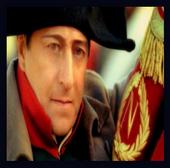Drapeau Personnel de L'Empereur
Moi sur le €100
FÉLICITATIONS, FRANCE...
Napoléon Bonaparte (Ajaccio, 15 août 1769 – Sainte-Hélène, 5 mai 1821), général de la Révolution, dirigea la France à partir de la fin 1799 et fut Empereur des Français, sous le nom de Napoléon Ier, de 1804 à 1814, puis à nouveau en 1815. Il conquit et gouverna la plus grande partie de l'Europe continentale et plaça ses maréchaux et ses frères sur les trônes de plusieurs royaumes européens : Espagne, Naples, Westphalie, Hollande, et Suède. Napoléon tenta de mettre un terme aux cycles de guerres que menaient les monarchies européennes contre la France depuis 1792, et face aux diverses coalitions montées et financées par l'Angleterre, le cycle impérial prit fin en 1815. L'historien Steven Englund écrivit « le ton (…) qui convient le mieux pour parler de Napoléon serait (…) une admiration frisant l'étonnement et une désapprobation constante frisant la tristesse. » Elie Faure, dans son ouvrage, qui a inspiré Abel Gance,intitulé «Napoléon», le compare à un prophète des temps modernes.
LA GRANDE ARMÉE
LE GARDE IMPÉRIALE
Napoleon Bonaparte (15 August 1769 – 5 May 1821) was a general of the French Revolution, and the ruler of France as First Consul (Premier Consul) of the French Republic from 11 November 1799 to 18 May 1804, then as Emperor of the French (Empereur des Français) and King of Italy under the name Napoleon I from 18 May 1804 to 6 April 1814, and again briefly from 20 March to 22 June 1815. Although Napoleon did little to develop innovative military strategies, other than to put into place the hitherto unused system of placing artillery in batteries, he did use the superior quality of the French army (as reformed under the various revolutionary governments) to win many successful campaigns and some surprising victories. His campaigns continue to be studied at military academies all over the world and he is generally regarded as one of the greatest commanders in history. Over the course of little more than a decade, he fought virtually every European power and acquired control of most of the western and central mainland of Europe by conquest or alliance until his disastrous invasion of Russia in 1812, followed by defeat at the Battle of Leipzig in October 1813, which led to his abdication several months later and his exile to the island of Elba. He staged a comeback known as the Hundred Days (les Cent Jours), but was again defeated decisively at the Battle of Waterloo in present day Belgium on June 18, 1815, followed shortly afterwards by his surrender to the British and his exile to the island of Saint Helena, where he died six years later. Aside from his military achievements, Napoleon is also remembered for the establishment of the Napoleonic Code. He is considered by some to have been one of the "enlightened despots".
I edited my profile with Thomas’ Myspace Editor V4.0 !
